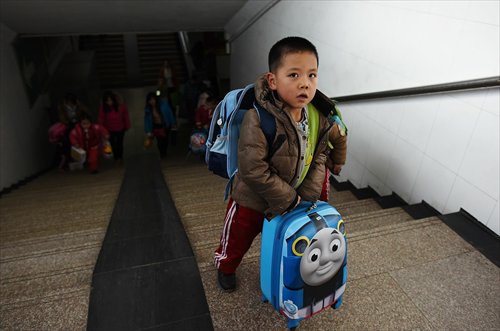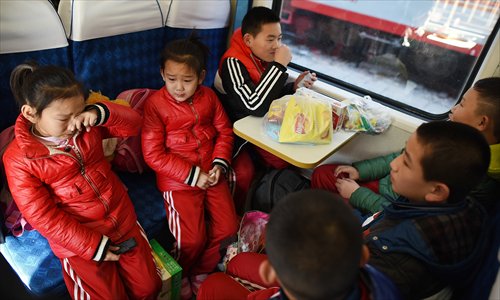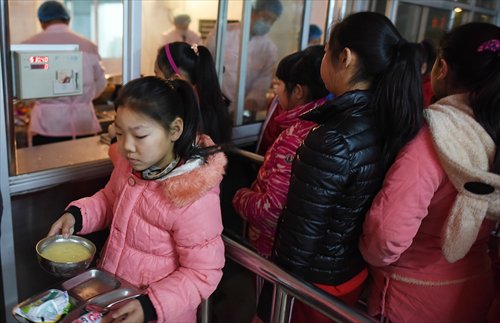Migrant children find schools far away
A lack of household registration in Beijing forces migrant workers to send their children as young as 5 off to a boarding school hours away in neighboring Hebei Province as they want to have a chance at getting into university in the future.

A young boy travels with his luggage to his school in Hebei Province. Photo: Huang Liang
On December 5, 10-year-old Pei Xiaotong waved goodbye to her parents for the 72nd time, heading back to her boarding school in Hengshui, Hebei Province.
Pei's parents saw her off at Beijing West Station, not leaving until her slight form was out of sight. They see her off every month, after her five-day trips home.
In developed countries, boarding schools are normally the preserve of the rich. But in China, boarding has become the only option for many ordinary migrant families, as local public schools set a high bar for the admission of migrant children.
Pei's parents, who are fruit vendors, were unable to send their daughter to a local public school in Beijing and had to send her to Yingcai School, a full-time boarding school in Hengshui 275 kilometers away, because they don't have a Beijing hukou (household registration).
"If we want to send her to a local school in Beijing, we have to get seven different certificates. To get some of the certificates, we have to travel back to our hometown. But we are so busy that we didn't have time for it, and we even have no time to take good care of her," Pei Yong, the father of Pei Xiaotong, who regularly works from 5 am to 10 pm in an open market, told the Global Times.
An increasing number of migrant workers in Beijing have decided to send their children to boarding schools in Hengshui, hoping local schools' high admissions rate in the college entrance exam would ensure their children a better future. Some of the children are still in kindergarten.
Beijing Youth Daily reported that at least 1,000 children of migrant workers from Beijing are now studying in private boarding schools in Hebei. They live independently in schools and seldom spend time with their parents.
The kids' parents vary. Some work on construction sites. Some are market vendors. Some even have stable jobs in State-owned companies.
Despite different backgrounds, they all have something in common: neither parent has a Beijing hukou, which means their children cannot sit the gaokao (college entrance examination) in Beijing. From the start, then, they have to plan how to get their child a shot at a decent university.

Some students cry in the train as they leave from Beijing to Hebei to attend school. Photo: Huang Liang
Trains to school
Pei Yong and his wife have worked in Beijing for over a decade. They live in a shack in a "village-in-the-city" outside the West Fourth Ring Road of Beijing, an area full of migrant workers.
Rows of shabby, flat houses line the uneven dust road. The road is so narrow that pedestrians would easily bump into homemade sausages, bacons and clothes that hung on the clotheslines.
Pei didn't complete primary school, but has bigger dreams for his daughter. Some other migrants from the same hometown recommended Yingcai to him, and, after several visits, he decided to send Xiaotong there.
"It was difficult for my daughter to go to local public schools. The quotas for non-local students were limited and the competition was fierce," Pei told the Global Times.
Even though the central government has long demanded local authorities clear up the threshold for non-local students when they attended local public schools, local authorities in big cities like Beijing and Shanghai have done little to improve the situation. Instead, they have set up entrance requirements as a way to control the number of students.
Pei Xiaotong might have no idea her rights to free education have been infringed, but she would rather not leave her parents.
"She didn't want to leave at the beginning, believing that we were abandoning her and discarding her in a faraway place. I persuaded her and told her we love her and we just wanted her to realize the dream of going to [top Beijing college] Tsinghua University if she attended this school, because compared with some private schools in Beijing, they offer a better education," Pei Yong said.
Tian Lin, a 12-year-old at the Yingcai School, has been going there since she was 6. Her mother Liu Hui had made a long-term plan for her since she was in the kindergarten: She wanted to send her daughter to Hengshui No.1 High School, which is said to have a 90 percent admissions rate in the college entrance exam.
"It is impossible for my child to sit the gaokao in Beijing, so I won't waste my child and let her study in Beijing's public schools. She is studying in Yingcai School and then will though Hengshui No.1 High School," Zhao said.
Even though Zhao's husband worked as a deputy director in a State-owned company, their daughter cannot sit the gaokao or attend high school in Beijing, due to her lack of a hukou.
Sitting the gaokao in Beijing is not just a matter of convenience. Beijing examinees also have a much lower admittance threshold for the top universities based in the city. Yingcai and other schools have built their reputation, attracting students from the neighboring provinces, due to their high scores in the all-important gaokao.

Lower circled: Students queue up for lunch in their school in Hengshui. Photo: Huang Liang
Isolated life
Yingcai launched in 1996 to alleviate the pressure of the growing number of school-age students. The school offers education from primary to high school, and now has over 800 boarding students. Nowadays, one-third of the school students are from Beijing, most of whose parents are migrant workers.
The train station even set up a special passage for the students and the teacher who escort them on the train when they travel back and forth between Beijing and Hengshui during their monthly vacations. It is common to see one carriage of the train occupied by students in uniform.
At the very beginning, most of the students could not get used to the school life. "Most of the students were not used to leaving their parents at such an early age. They would experience depression and frustration. But most of them could get used to campus life after one or two months later," Zhang, vice-principal of Yingcai School, told the Global Times.
It is not uncommon for children to suddenly burst into tears after their parents leave them, especially those in pre-school. Some would even cry all the way to the school. If the teacher failed to stop them from crying, the school might send them back home and no longer take them in.
In some separate cases, some parents had to send their children back and forth several times before they eventually gave up.
Education experts said boarding school is not suitable for every child. For those who are introverted, separation from their parents at an early age might result in severe consequences, such as being unsociable and unconfident, which is not benefit for their mental health, education expert said.
When Pei Xiaotong firstly came to the school, at just 7 years old, she spent her time crying in her quilt. She could not blend in with her friends, and was a little "disobedient to the school regulations." She could not get up at 6 am. Her pal Zhang Mengjia, who is also a neighbor in Beijing, could not make friends for the first semester.
For some students at lower grades, especially in the pre-schools, they have to be taken care of by teachers all through the day.
The school has adopted a military management system and campus life was tense and repetitive. To get high scores in the gaokao, when the children are 18, is the top priority.
Every morning, when the clock strikes 5:50, children haul themselves out of bed and wash within 15 minutes. Then, everyone was asked to do morning exercise collectively on the playground.
Breakfast starts at 6 am followed by morning reading. Students above primary school have to take seven lessons in the daytime and do two hours self-study at night.
Most of the parents are satisfied with the teaching quality. Tian Lin ranked in the top three in his class and the headmaster told her mother if she keeps with her study, Tian could pass through the entrance exam for Hengshui No.1 High School.
Most parents are delighted to find their children who used to be reliant on their parents become independent and are capable of taking care of themselves several months after they were sent to school.
"Xiaotong would help us clean the room and tidy up the bed after she came back from school, which she never did before. We were so happy about it," Pei said.
But loneliness is a sure thing. Students are not allowed to use mobile phones. Parents can call their children's teacher and talk to them on every Saturday night, but only for a few minutes. Sometimes the line is too busy to call in.
Before Pei Xiaotong set out for school, she went to a nearby shop and bought two teddy bears, pink and blue. She carried one along with her to school and left one to her mother, saying "Mom, if you miss me, you could hug the teddy bear, as it represents me."
Parents struggle to find time with their kids during the 5-day monthly vacation.
Experts said the authorities should solve the problem by even distribution of the education resources and lowering the threshold for the non-local school students.
"Local authorities should devise a way to evenly distribute the education resources and improve the number of teaching staff to ensure the equal education rights of the children of migrant workers, rather than setting up barriers to stop them from flooding into the cities," Xiong Bingqi, an education expert and vice president of the 21st Century Education Research Institute, told the Global Times.
Newspaper headline: On their own